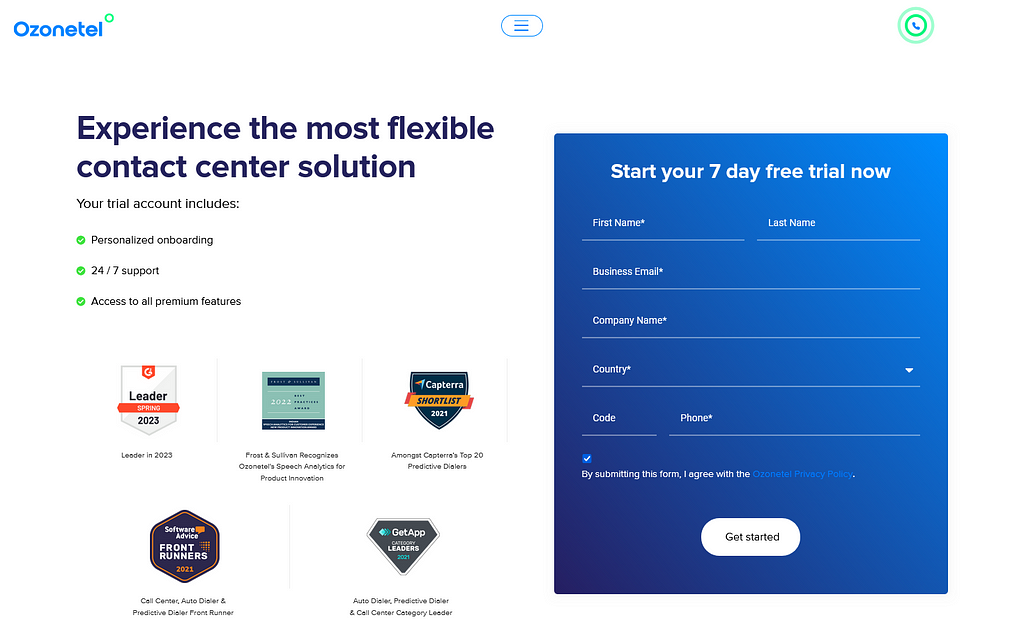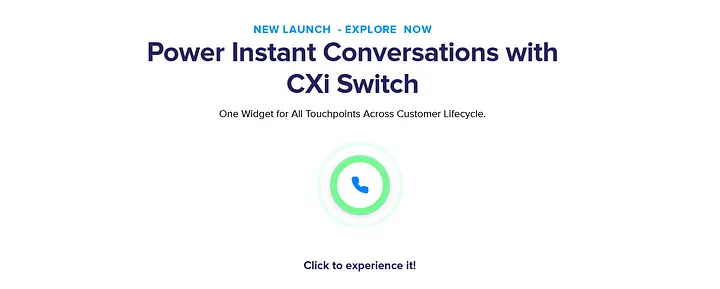- Resources
- How to Choose a Call Center Dialer to Charge Up your Outbound Productivity
How to Choose a Call Center Dialer to Charge Up your Outbound Productivity

Business projects depend heavily on outbound sales calls for prospecting, pitching and closing deals. Did you know that a single 1-hour long B2B sales call could cost you anywhere between $800 and $1000? Without a scalable call center dialer, your B2B sale call could quickly escalate and impact your bottom line results.
It is impossible to think of any successful sales organization without an intelligent outbound sales calling strategy. And, therefore, for more reasons than one can imagine, a call center dialer should always be the cornerstone of your sales call operations, especially for setting up numerous cold calls and scheduled calls with your prospects and customers that can run into minutes and hours.
Here is a detailed layout for your outbound sales strategy pivoted on powerful call center dialer technology.
Call Center Dialer: Simplifying Outbound Sales with Automated Dial-In Functions
A call center dialer or simply “dialer” is a software-based automated dialing solution for outbound calls and messages. It is packaged as part of modern-day contact center platforms that dial phone numbers from your existing database and intelligently analyze and document the outcome of each call without human intervention.
Dialers in call centers are used to simplify sales calling processes by outsourcing a part or bulk of dialing and texting through pre-recorded voice messages, IVRs, chat notifications and SMS. In recent years, call center dialers have proved to be excellent tools for users outside of sales teams too, especially for Product Marketing and HR departments who now use contact centers for a variety of outreach campaigns.
Agents in the outbound sales and customer support teams remain the primary users of call center dialers; but these can be quickly scaled to other departments as well based on overall organizational goals and objectives.
Significance of Call Center Dialers for Different Business Needs.
Outbound Lead Generation
Sales executives rely on outbound lead generation tactics to reach out to potential buyers using automated dialers. This communication involves cold calling to gain the attention of the prospects and share information about the company’s products and services. A similar tactic is used for outbound sales conversations built using demand-generation resources.
Campaign Marketing
Businesses that launch new products more often during a year compared to their competitors require a powerful outbound campaign marketing strategy to stay connected with their regular customers. Call dialers are used by client-facing departments to pick the interest of regular customers and generate engagement with upcoming or newly launched products. This significantly boosts customer lifetime value (CLV) and directly impacts sales opportunities with a deepened influence on the overall buying journey.
Social Selling
More and more brands are utilizing social media platforms and messaging channels for brand awareness and lead generation. Call dialers can contact prospects who have shared their phone numbers on your business pages or contact forms. This tactic works great for on-demand customer service teams in real estate, banking and finance and e-commerce.
Content Marketing
Do you have a new whitepaper or e-book to share with your customers? Content marketing teams could utilize call dialers to accelerate their content syndication goals and reach their target audience across multiple channels such as email, WhatsApp and even print!
Hiring and Recruitment
A growing business opportunity for call dialer platforms has emerged from HR organizations that use outbound calling strategies to contact relevant talent pools in the industry. Hiring and recruitment companies can scale their calling operations and reach 5x more candidates in 50% lesser time.
Types of Dialers That Businesses Could Invest in
Auto Dialers
Colloquially representing the modern-day call centers that heavily do outbound calling, auto-dialers are fast-replacing human agents from the scenario.
There are three specialized types of call dialers in this family:
1. Power Dialers
2. Preview Dialers
3. Progressive Dialer
These are broadly classified into:
- Manual VoIP Dialers: Used by small-sized call centers that rely on live agents for outbound sales calling. Mostly used in startup lead generation companies that have less than 10 SDRs and AEs.
- Auto Dialers: Heavy-duty auto dialer solution for large-scale outbound marketing and sales calling campaigns, often requiring unified omnichannel integration with other solutions such as IVRs, CRMs, marketing automation and CX management. These are mostly operated through cloud-hosted functions and integrations for enhanced transparency, reliability and security.
Power Dialers
Generally called outbound dialers, these are the regular ammunition for a call center that must reach many leads or contacts. Power dialing allows agents to sequentially dial-in contact numbers from a database. Automated power dialer software does the dial-in so that agents do not have to waste time looking at which number to manually dial next.
Pros
- 100% dial-in rate based on CRM database.
- Improved call dialing volume per day/ week and month.
Cons
- The agent must wait for the dialer to dial-in and complete the sequence based on the contact’s availability and status (picked, hold, missed, dropped, abandoned).
- In most cases, power dialers do not have a call return facility, meaning agents would not be able to contact the missed numbers until they exhaust the list.
Preview Dialers
Outbound sales agents use automated and semi-automated preview dialer software to contact customers with customizable conversations built on “previewed” customer data-driven insights and analytics. Agents commence the call only after fully understanding the persona of their target contact and setting up a call using an auto dialer.
Agents use preview dialers to set up a callback with customers using other omnichannel communication routes to fulfil business goals and win customers with on-demand opportunities.
Pros
- Personalized conversation based on customer’s previous interactions and omnichannel insights.
- Constant CRM and contact center interaction to help agents build a more refined outbound calling strategy for targeted contacts.
- Works best for B2B and high-premium customers and leads who wish agents to call them at a time of their convenience and choice.
- Great for large-sized call centers that must target customers based on their recent behaviors and attitudes.
Cons
- Agent idle time could increase depending on individual satisfaction and engagement levels.
- Without contact information, agents cannot proceed further.
- In high churn call centers where hand-over could take months, preview dialers may not achieve the intended results.
Progressive Dialer
High-performing agents use preview dialers to set up their outbound calls with customers. A progressive dialer assigns one contact per agent and is extremely nimble in detecting which contacts are more likely to get connected with a real human on the other hand. Progressive dialer software avoid answering machines, disconnected or wrong numbers and busy tones. The dialer keeps contacting the numbers from the database until a human picks up and forwards the call to the human agent or IVR.
Pros
- Easy to use and smoothen sales calling process.
- Reduce idle time of agents.
- Easy to clean up CRMs based on disconnects, busy and abandonment incidents.
Cons
- Agents must track their call numbers. Auto-dialers can significantly reduce the number of per-agent calls per day if the database is not updated or has errors.
Ready to take control of your call transfer
experience for better CX outcomes?
Prashanth Kancherla
Chief Operating Officer, Ozonetel Communications
Over the past decade, Prashanth has worked with 3000+ customer experience and contact center leaders...
Chief Operating Officer, Ozonetel Communications
Over the past decade, Prashanth has worked with 3000+ customer experience and contact center leaders to comprehensively understand the need for effective and efficient customer communications at every step of their journey with a brand. Deeply embedded in today’s CCaaS ecosystem, he has been instrumental in Ozonetel's growth and contributed in various roles including product management, sales, and solution architecture.







